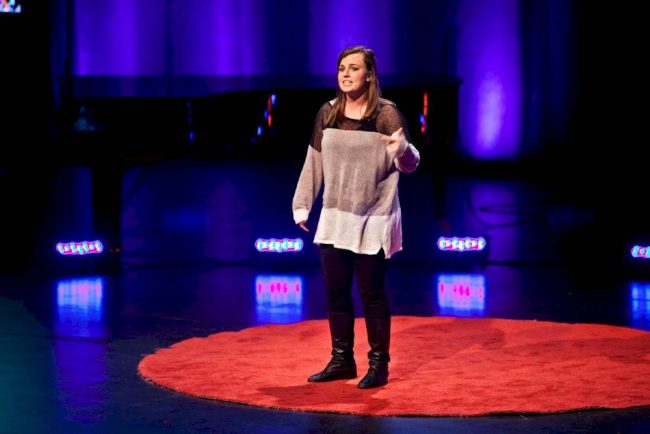She never thought she would speak out about her eating disorder. However, she took steps. Therapist. Spoken word competitions. TEDxSMU audition video?
“Bones, barely dressed, in flesh. The wheelchair cradled the death wish I was never granted,” spoke Baylor graduate student Lauren Bagwell.
Bagwell opened her TEDxKids@SMU discussion with a spoken word performance. She spoke about her personal journey with binge eating disorder to more than 400 middle school students who attended the October event.
It is estimated that 30 million people in the U.S. suffer from an eating disorder, according to the National Association of Anorexia Nervosa and Associated Disorders. Binge eating is more common than bulimia and anorexia.
Sufferers feel as if they are unable to stop consuming food, even when they’re not hungry. They also tend to eat food at a fast rate in one sitting. As a result, many try to hide their eating habits out of shame or guilt.
Bagwell began binge eating in middle school.
“I was really excited to share with middle schoolers,” Bagwell said. “Negative body image starts really young. It is cool to be able to speak truth into their lives.”
Many teenagers try to control their weight in unhealthy ways. The National Eating Disorder Association estimates that more than 50 percent of girls and almost one-third of boys do so.
Bagwell was finally diagnosed with binge eating disorder during her freshman year in college.
SMU-TV’s Lauren Castle interviewed Bagwell to find out more on her story.
SMU-TV: Explain the TEDxKids@SMU Process. Was the audience engaging?
Bagwell: “It was exactly the audience that I needed to be with. All the students were from middle school and they all had to apply to be there. It made the environment really cool, because everyone there was kind of a nerd in the best way possible.”
SMU-TV: Tell me about your spoken word. It seems like it was not your first time performing.
Bagwell: “I’ve done spoken word since my sophomore year in high school. I competed for a while. It is kind of a really cool and authentic way to communicate stories to people. For my thesis, I am looking at how spoken word can be used in the social studies setting.”
SMU-TV: Was this your first time speaking on your binge eating journey?
Bagwell: “I was on the Dallas Youth [Poetry] Team. We competed in a competition called Brave New Voices. The first poem that I did, was a poem that my coaches and teammates had challenged me to write. It was around the time that I got diagnosed. As I began to share my story, I got more freedom from it.
It was cool because I was able to articulate a situation that I had felt like I was alone. Finding the voice in sharing that experience, made me want to share it so others would know that they are not alone.”
SMU-TV: Why do you think your TED talk became popular among college women?
Bagwell: “I think a lot of people related to it [because it] is more uncommon to find a girl or guy that truly loves everything about themselves. I think it is something that a lot of people struggle with but not necessarily talk about. A lot of people were waiting for a voice to describe what they are experiencing.”
SMU-TV: What do you think college students should know about eating disorders?
Bagwell: “In my journey, I struggled with the idea of your body is nothing more than the vehicle of the essence of who you are. It houses your soul. We were all given one body and one set of talents that no one else has. You can’t be replaced. If you are not present on who you are, then the world misses out on something that it needs.”
SMU-TV: What is the most difficult thing that suffering from binge eating go through?
Bagwell: “I think the shame. I think there is a reason why it is the most common of the three [major] eating disorders and the least talked about. Especially with the growing epidemic of obesity, people see overeating as self-indulging. There is a stigma that if you are overeating you can help it and you need to be active. I would say that in high school I was an athlete. I don’t think anyone would considered me overweight.”
SMU-TV: Do believe society has misconceptions on binge eating? If so, what are they?
Bagwell: “It is a way to feel in control and a way to feel in power. The misconception is that it is only for one gender or only for one type of person. Binge eating is probably affecting a lot more people that we lead ourselves to believe.
That is the hardest thing. To know that there is a lot of people struggling with their self-worth.”
Make sure to watch “Get Healthy! Get Fit!” every Friday on The Daily Update.









